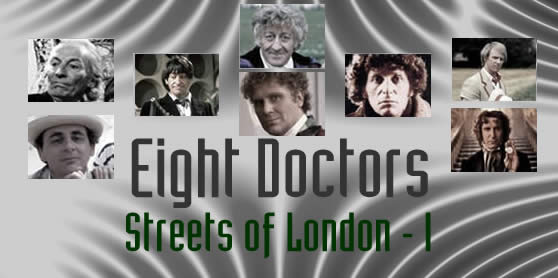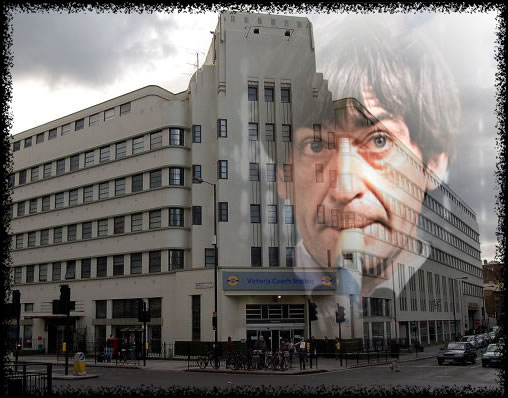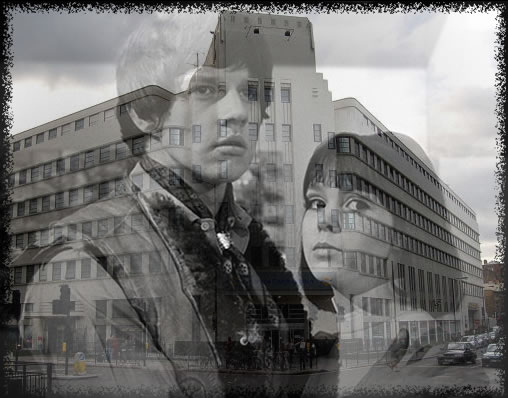

The TARDIS was racing through the Sol system far more swiftly than anything that the only sentient species on any planet in that system had yet developed. It was following a capsule that was clearly not designed on planet Earth, but which was heading towards it now.
“I don’t like it,” The Doctor muttered as he plotted the course of the capsule on the TARDIS scanner. “I don’t like it at all. It’s only 1979 by Earth time. This is too early in Human history for official contact with other races. It must be some kind of alien incursion.”
“Incursion?” Jamie queried.
“Invasion,” The Doctor amended.
“An alien invasion, in the year 1979?” Zoë queried. “That can’t be right.”
“Why cannae it not?” asked Jamie, looking across the console from where he was reading off figures on a dial for The Doctor.
“Because I come from the future and I know Earth history and there wasn’t an invasion in 1979.”
“Ah,” The Doctor said, looking up from the navigation controls. “Well, there could be two obvious reasons for that. The first is that time is in flux and you come from one of many possible futures where an invasion didn’t happen.”
“Yes, of course, Doctor,” Zoë conceded. “I never thought of that possibility.”
“What’s the other?” Jamie asked. He wasn’t sure he understood what The Doctor meant, and he was slightly suspicious that Zoë didn’t either but was humouring him.
“That we manage to thwart the attempt and therefore it never reaches the history books. After all, the Great Intelligence’s two attempts were never recorded for posterity, nor the Cyberman offensive that we were involved in along with those brave men from U.N.I.T.”
“That is perfectly true,” Zoë again conceded. “I really hope that IS what happened – or is going to happen, or will happen.”
“It is impossible to say,” The Doctor said. “One thing is certain. We are part of events, now. We must continue on our course to Earth, no matter what the consequences.”
The consequences were immense and they were varied. They may well be destined to defeat this new threat to Earth, but they might lose their own lives in the attempt. They might fail and open up one of those alternative time lines he suggested. They might win and still cause a skew in causality.
Earth rapidly came into view on the wall screen. It was a view that Zoë was familiar with, except that the great orbital Wheel that she worked on was many decades away from being established. For Jamie it was relatively new. In the eighteenth century nobody really knew what Earth looked like from above. Map-makers had created globes that came close to modelling the planet in miniature, but they were only making educated guesses based on the charts of sea-bound explorers.
He never forgot how unique he was among men of his own century to be travelling beyond the bounds of his world.
“What sort of ship is it, anyway?” he asked. “It’s not the Cybermen again, is it?”
“No,” The Doctor answered with certainty. “Their ships are very different. Nor is it the Ice Warriors of Mars. This came from outside your solar system. I really don’t know.”
“Are we sure it’s hostile?” Zoë asked. “Isn’t it at all possible that they may be friendly?”
“That’s ALWAYS possible, my dear Zoë,” The Doctor replied. “But until we know for sure, we mustn’t lose sight of them.”
And they wouldn’t have if the TARDIS hadn’t swerved suddenly to avoid a small asteroid that had been dragged out of its usual orbit between Mars and Jupiter by the trajectory of the alien ship. When everyone picked themselves up, nursing minor bruises and abrasions, they were off course. It took a good ten minutes for The Doctor to put the TARDIS back on target.
“The problem is, we were knocked out of time as well as space,” he said. “We are going to be arriving some time AFTER the alien ship – as much as three months later, I calculate.”
“That’s not good,” Zoë observed. “Any invasion might be well laid in by then.”
“I know,” The Doctor said. “But there is nothing I can do. As I said before, we are part of events, now. Chance has made us late. Even in a time machine I cannot turn back the clock, now.”
“Why cannae ye not?” Jamie asked. The Doctor sighed and began to explain the fragile nature of causality in terms that a Phiobaire from the field of Culloden might understand. He only succeeded in confusing even himself in the attempt. Meanwhile, the TARDIS fixed on a landing spot close to where it had already calculated that the alien ship would have arrived and initiated an automatic materialisation. The Doctor checked that the decision concurred with his own and let it get on with it.
“We’re landing in central London,” he confirmed. “Terra Cognito at least. It’s mid-summer, nice and warm. No coats needed.”
Zoë double-checked that. She had more than once stepped out of the TARDIS without wearing any outerwear and immediately run back in to find a thermal lined coat.
It was warm, as The Doctor had promised.
“A little too warm for London,” she noted. “It’s more like the tropics.”
“A summer heatwave, very nice,” The Doctor remarked gleefully. He picked a blue parasol from the hatstand by the door and handed it to Zoë. She looked at it and put it back.
“It doesn’t go with my outfit,” she said. Jamie glanced at the salmon pink t-shirt and deeper red knee length skirt she was wearing. A blue parasol didn’t see too outlandish to him, but then he really didn’t know anything about women’s fashions outside of his own century.
The Doctor had no comment at all about her clothes and he was quite ambivalent about the parasol. He, himself, left his jacket off and stepped out of the TARDIS in his usual baggy trousers held up by braced over a checked shirt.
“Where are we, exactly?” Jamie asked looking around at the quiet street. There was a line of empty black London taxis parked up and a newspaper kiosk with newspapers waiting to be sold but nobody to sell them. Across the road was a café that didn’t seem to open for business, either.
Zoë looked up at the clean, white Art Deco façade of the large building the TARDIS had materialised beside.
“Victoria Coach Station,” she said. “How interesting. I’ve been here in my own century. It’s a museum of land transport – buses, lorries, taxies like those ones over there. In my time we travel by air cars with landing bays on top of the buildings. Until I came to London with The Doctor I’d never even seen a bus or a taxi actually moving on the ground.”
“I dinnae think ye’re going to see any of them moving today,” Jamie remarked as he stepped through the entrance into the coach station. “It must be Sunday. Nothing is going anywhere.”
“That’s very odd,” The Doctor commented. “Even on a Sunday this should be a busy place. Coaches come in and out almost non-stop, from early morning to late at night. Something isn’t right here.”
“Everyone left in a hurry,” Zoë noted. “Doctor, this isn’t right, surely?”
The Doctor walked casually around the departure terminal noting several things – first that all of the clocks in the building were still running. It was twenty-three minutes past eleven in the morning as he walked past one of them. The second thing he noticed was that several of the coaches waiting to pick up passengers still had their engines running and doors open. The coach that should have left for Poole via London Heathrow Airport, Southampton and Bournemouth at eleven o’clock still had its luggage compartment open. Suitcases were still piled up waiting to be loaded.
“Whatever happened, happened at maybe five minutes before eleven o’clock,” he concluded out loud. “The coaches due out at quarter past haven’t started loading. Those at a quarter to had already gone before it happened.”
Zoë looked at the suitcases and travel bags left at departure gates and beside seats all over the terminal. Hundreds of people had abandoned their possessions. She looked closely at a big radio cassette player of the sort used in this era. A set of headphones was plugged in and the play button was down. She listened for a moment. There was still music playing. She ejected the cassette, noting how old-fashioned and simple an idea it was compared to the solid state portable music wafers of her time that could be worn as hair slides. She guessed from the amount of magnetic tape left on the reel that it had about five minutes left to play. Each side contained twenty minutes of music before it had to be changed by the listener. Again, that was very primitive to her. Those portable wafers she was thinking of could contain as much as thirty hours of content.
But it confirmed The Doctor’s theory that this all happened no more than fifteen minutes ago. Partly eaten food, polystyrene cups of coffee that were still luke-warm were also corroborating evidence.
“Oh, Doctor!” Zoë picked up a doll that had fallen on its back across one of the seats. “There were children here.”
“Yes,” he answered with perfect logic. “There would have been.” He was looking out through the partition between the passenger waiting area and the coaches themselves. There was a glass roof over the loading bay so that nobody had to get wet or cold while boarding the coaches, but it was open all along the far side where the vehicles departed. Despite that, quite a lot of diesel fumes were building up within the area.
“It isn’t a bomb scare,” he concluded. “In that event, drivers would be instructed to turn off their engines to minimise the risk of fire. Jamie, we need to shut them off before the carbon monoxide builds up to a critical level. Wrap something around your face and come on out with me. I’ll show you what to do. Zoë, my dear, will you go back outside and see how far this strange phenomena extends. The street immediately outside was empty, but there are main roads where traffic passes constantly, another depot serving London transport buses, a tube and overland railway station. If those, too, are deserted, then the problem is even more serious than it appears to be at first glance.”
Zoë wasn’t sure she wanted to go back outside on her own. What frightened her more – the deserted street or the possibility of teeming life a short walk away – she couldn’t say, but she felt strangely vulnerable about going on her own.
But she would never let The Doctor or Jamie know that. She hugged them both and headed for the exit onto Elizabeth Street where they had come in.
Jamie picked up a woollen scarf discarded by one of the missing passengers and wrapped it around his face as The Doctor had suggested, then he followed him out onto the coach apron. The smell of diesel fumes was unpleasantly obvious even through his makeshift face mask and though he didn’t really know what carbon monoxide was, a young man who was used to the fresh clean air of the Highlands knew that this wasn’t healthy.
The Doctor didn’t seem to need any face covering, though even he coughed as he approached the rear of the first coach.
“There’s an emergency cut off switch here,” he told Jamie, reaching for a discreet panel and lifting it to reveal a lever. He turned it and the engine died, as did the stream of fumes from the exhaust pipe. Once he knew what to do Jamie moved quickly along the line of coaches in one direction while The Doctor went in the other.
Zoë walked up the silent Elizabeth Street to the junction with the excitingly named Buckingham Palace Road. She had never seen the Palace. It wasn’t there in her time, and she would have liked to have taken a look, but it was probably too far away.
Besides, she wasn’t sure she wanted to see it if it was as empty of Human life as the road was. At the junction there were three private cars, a black cab and a double decker bus smashed together in a horrendous collision, but there were no injuries. There hadn’t been any passengers or drivers in any of the vehicles when they ran into each other.
Further on she came to the place where the red London buses stopped beside the west façade of Victoria railway station. Two of them had mounted the pavement and smashed into the nineteenth century brickwork, but again there were no injuries.
In the cafes, restaurants, pubs and shops on the other side of the road there were no customers or staff. In the case of one chip shop, that was fortunate since the fryers had overheated due to lack of attendance and caught fire. There was nobody to sound an alarm and bring a fire engine to deal with the blaze. Zoë wondered what would happen if the fire spread to the adjacent buildings.
The crashed vehicles, the fire, the absolute lack of any life told her that this was very different from the last time she saw central London as quiet as this. When the Cybermen were advancing through the streets people had been told to stay in their homes and stay calm. They hadn’t left cars with engines running or fryers still heating up to the point of conflagration.
Besides, in such a case, there would probably be military patrols, and possibly a few people chancing the danger in order to loot the shops. There was nothing like that happening.
She was alone, the only person alive in the whole of London as far as she could see.
Well, there was The Doctor and Jamie, of course, but they were back at the coach station and it felt a VERY long way back as she stood by the grand front entrance to Victoria station and looked at all the stationary buses and taxis with no passengers. She stepped inside the foyer and her feet echoed in the emptiness.
This was just the same as the coach station. Luggage, umbrellas, toys, bicycles, a trolley loaded with packs of paper towels for the train toilets were left behind as the people disappeared. Coffee went cold. Chips went limp. She accidentally trod on a half-eaten bar of chocolate. The big electronic board showed trains due in and out, but there were no passengers and nobody to take the tickets at the gate.
She stepped through one of the gates onto a platform. There was a train waiting. At the far end its diesel engine was ticking over. There were signal lights on green for it to leave the station. A whistle and wooden signal paddle lay on the ground, abandoned by the signalman who let the guard at the back end of the train know that it was ready to be off. Both signalman and guard were gone.
“What is HAPPENING?” Zoë asked out loud in a tremulous tone. Her voice echoed up around the elegantly curved station roof. She hated the sound of it even more than she hated the silence. She turned and ran back up the platform, through the ticket barrier and across the wide entrance hall.
Outside she stopped to get her breath back. It felt a little less frightening in the open air. She looked up and saw a bird high in the sky. There WAS life on the planet. This WAS just a strange local phenomena.
“Miss, don’t move, put your hands up!” Zoë was startled when she actually heard a Human voice. She turned, despite the order not to move, and saw three soldiers, one clearly in charge of the other two, pointing rifles at her. Instead of being frightened by the sight of the guns she was overjoyed. There WERE people here, after all.
Then she ran up to the officer and wrapped her arms around his neck, kissing his cheek.
“Oh, thank goodness, it’s you,” she said. “Thank goodness.”

 |